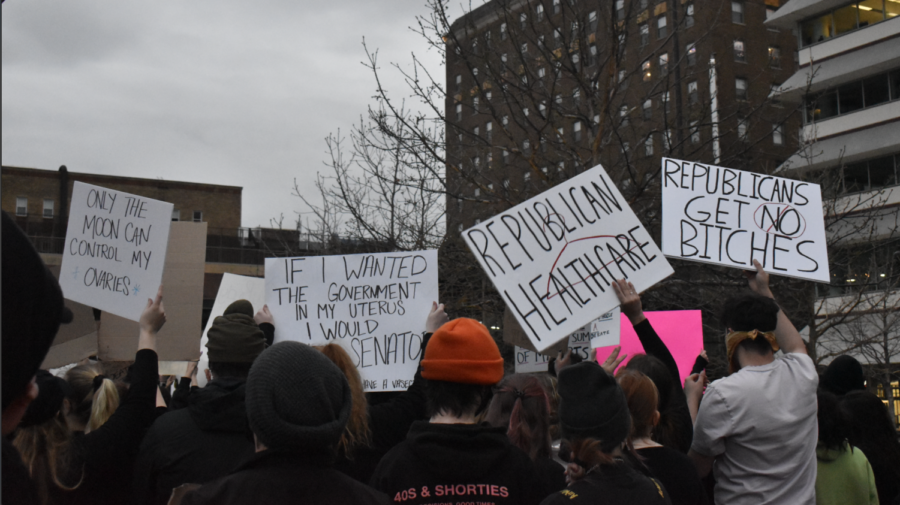Ramey: The conversation around abortion
Amber Mohmand/Iowa State Daily
Earlier this year, hundreds marched from Cowles Commons in downtown Des Moines to the new federal courthouse under construction at Locust Street and Second Avenue to fight for reproductive rights and safe access to abortions.
September 13, 2022
With Roe v. Wade being overturned, abortion is a hot topic going into tight, competitive and crucial midterm races. This controversial topic brings out the emotion and passion inside all of us, and I think it’s important that we all stay level-headed and rational about our opinion regarding it.
Conversations around abortion have been disappointing, to say the least. Both sides have a bad problem of accusing the other of acting maliciously, and there never seems to be any progress.
Unfortunately, the conversation around abortion is, in my opinion, plagued with a lack of charitability and originality that only regress the conversation. If you are thinking that I am going to put down or shame people who have expressed their opinion about this topic, please do not. That is not my intent here. My goal is to offer a pro-life viewpoint that is expressed in a way to promote good faith and progress the conversation.
As a pro-life person, I believe it is important to address and challenge many of the objections the pro-choice movement has to our views. They will ask, “why do men have any say on something that happens to women’s bodies? If you don’t like abortion, why can you not just abstain and not push your views on other people? Why is it okay to regulate what someone does with their body?” The people in the pro-choice movement — at least those who are intellectually honest and charitable — deserve reasonable and clear responses to these questions.
So why should men like me have any say on whether women have the choice to get an abortion or not? The reason we do is the same reason why white people ought to fight for equal rights for minorities and why the rich ought to fight for equal opportunity for the socioeconomically disadvantaged. This is because rational and moral human beings have an obligation to protect the rights and well-being of other persons regardless of racial groups, economic status or gender.
The pro-life movement believes that unborn children are persons deserving of moral consideration and no civil society should allow their right to life be violated. So, what gives us the right to push our views on other people?
Putting this into perspective shows just how uncontroversial it really is for us to impose our views. In a way, all laws, rules and activism are a way of us imposing our views on other people. Think about animal rights activists who believe in stopping many of us from eating meat or even Marxists who want to change our entire economic system because they believe our current system is inherently immoral. Even if we disagree, we would hardly ever claim these people who fight for what they believe in to be deserving of moral condemnation.
Many will argue that abortion is justified because it helps economic outcomes, especially for the disadvantaged. It makes the lives of these people easier and frees them to many opportunities they otherwise wouldn’t have had without access to abortion. I think this view is mistaken.
The problem with these arguments is we could just as easily use these arguments to justify infanticide. We could expect economic outcomes to improve if we allowed abortion up to a year after birth or even longer, but this seems intuitively wrong, and we would never use this argument for infants, so why use them for a fetus? Just because something is economically effective or emotionally appealing does not make it morally permissible.








Mary Darrow | Sep 17, 2022 at 7:31 am
The belief that “life begins at conception” is purely a religious one. Through your arguments, you are simply forcing your religious beliefs unto others while also ignoring the rights of women to make decisions about their health, bodies, and life along with their doctor, partner, and/or family. Why not just implement mandatory vasectomies at age 16? Think about how it might feel to have your bodily organs and religious beliefs regulated by government.
Margaret Holmgren | Sep 14, 2022 at 9:55 am
Thank you for your thoughtful article and commitment to civility. If you could establish that the fetus has a right to life for conception on grounds independent of religious belief, then your argument would be very strong. Or if you could establish how much moral consideration t deserves at the various stages of the pregnancy independent of religious beliefs, again you would have grounds for a strong position on abortion. If not, your argument runs afoul of the establishment clause of the First Amendment.
Nuke | Sep 14, 2022 at 8:47 am
Not sure what is good-faith about this argument, especially considering the author’s implied assumption that a fetus is even remotely viable before 22 weeks. I wonder if the author supports the ban of abortion in all cases. If so, this whole article is disingenuous in its plea for civility in this discussion.
Lucas | Sep 16, 2022 at 5:01 pm
So because I don’t believe viability is a necessary condition for something to have moral consideration my argument is bad faith and disingenuous? How?